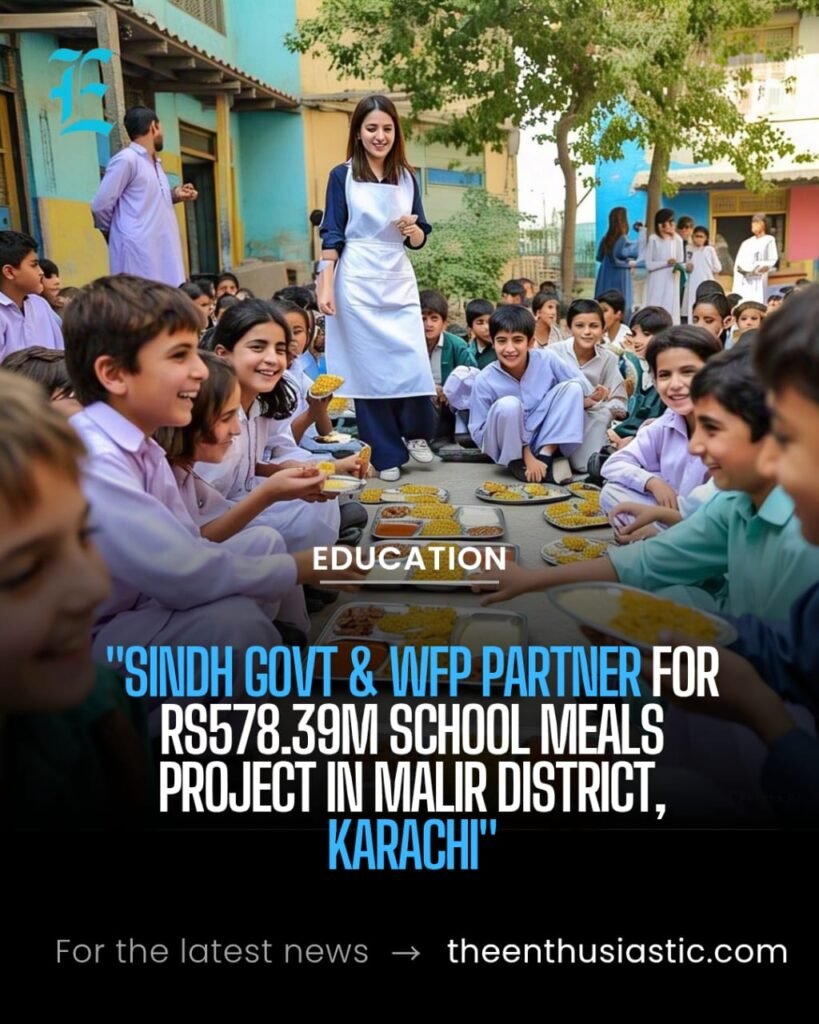Sindh Govt & WFP Partner for Rs578.39m School Meals Project in Malir District, Karachi

Table of Contents
Introduction:
The Sindh Government and WFP launch a Rs578.39 million school meals project in Malir District, Karachi, to serve hot daily meals to 11,000 primary school students, aiming to boost nutrition, education, and gender equality.
A Bold Step Towards Healthier Classrooms in Sindh
In a progressive move to tackle malnutrition and improve educational outcomes, the Sindh Government and the World Food Programme (WFP) have partnered on a Rs578.39 million school meals initiative. The one-year pilot project will provide hot daily meals to 11,000 primary school students in Malir District, Karachi, representing a major investment in child welfare and education.
Funding and Collaboration: A Strong Public-Private Partnership
The project is a result of strategic financial collaboration:
Sindh Government: Contributing 80% (Rs462.71 million)
WFP: Funding 20% (Rs115.68 million)
This partnership underlines the Sindh government’s commitment to uplifting underprivileged children and aligns with global development goals on hunger and education.
Why School Meals Matter
Providing meals in schools isn’t just about feeding children—it’s about building a future. Hunger in classrooms is a silent barrier that affects focus, energy levels, attendance, and academic performance.
Key Goals of the Project:
Combat Classroom Hunger
Boost Attendance & Retention
Improve Learning and Concentration
Promote Gender Equality by Encouraging Girls’ Education
Reduce Malnutrition Rates
What’s on the Menu?
The meals are designed to be both nutritious and culturally relevant. A centralized kitchen system will prepare, package, and distribute the meals daily.
Daily Meal Components:
Lentils
Rice or Bread
Cooked Vegetables
Weekly Fruit Servings
Every item has been selected to support the dietary needs of growing children.
Ensuring Quality and Hygiene
Role of Sindh Food Authority
To maintain food safety, the Sindh Food Authority will:
Monitor meal preparation
Enforce hygiene standards
Ensure meals meet nutritional benchmarks
Role of WFP
The World Food Programme will:
Oversee implementation
Monitor and evaluate on-ground execution
Share international best practices
Link to Broader Health Programs
This project complements Sindh’s other healthcare initiatives like:
Nashonuma (nutrition support for pregnant women and children)
Mamta (maternal and child healthcare)
Together, these programs aim to provide a 360-degree support system for vulnerable families in Sindh.
Focusing on Gender Inclusion
An important highlight of this initiative is its push to reduce gender disparity in education. In communities where girls’ education is still undervalued, free school meals offer:
Incentives for families to send their daughters to school
A safe space for girls to study, grow, and thrive
Better long-term outcomes in literacy and empowerment
Expected Long-Term Impact
1. Improved Attendance
Free meals act as a powerful motivator for both children and parents, helping ensure students come to school regularly.
2. Better Academic Performance
Nutritious food enhances cognitive function, energy, and concentration, directly influencing classroom performance.
3. Reduced Dropout Rates
Parents may reconsider pulling children out of school when there’s a tangible benefit like daily meals.
4. Local Economic Opportunities
Central kitchens could create local jobs and stimulate small-scale food suppliers in the region.
Voices Behind the Project
“This initiative is about more than meals—it’s about giving children the energy and opportunity to learn,” said a Sindh Education Department spokesperson.
A WFP official added, “We’re proud to be part of this impactful project. Well-fed children are our best investment in the future.”
Scalability and Future Plans
If this pilot program is successful in Malir, it could become a template for other districts in Sindh—and potentially across Pakistan. The scalable model focuses on:
Centralized kitchen infrastructure
Streamlined logistics
Collaboration with education and health departments
Conclusion: Feeding Hope, Fueling Futures
The Rs578.39 million school meals project is not just about food—it’s a transformational step toward a brighter, healthier, and more educated future for the children of Malir. By ensuring no child learns on an empty stomach, the Sindh Government and WFP are sowing the seeds of long-term change.
This project proves that collaboration between government and global partners can make a real difference. It feeds bodies, minds, and aspirations.
FAQs
1. Who is funding the Sindh school meals project?
The Sindh Government is funding 80% (Rs462.71 million), and the World Food Programme (WFP) is contributing 20% (Rs115.68 million).
2. How many students will benefit from this initiative?
Around 11,000 primary school students in Malir District, Karachi, will receive daily hot meals.
3. What meals are being served?
Meals will include lentils, rice or bread, vegetables, and weekly fruits, designed to meet daily nutrition requirements.
4. How is food safety being maintained?
The Sindh Food Authority will monitor hygiene and nutritional standards, while WFP oversees implementation and evaluation.
5. Will this program expand to other districts?
Yes, if successful, the project could pave the way for similar school meal initiatives in other parts of Sindh.
